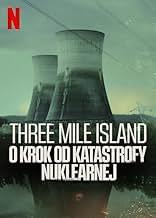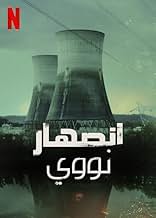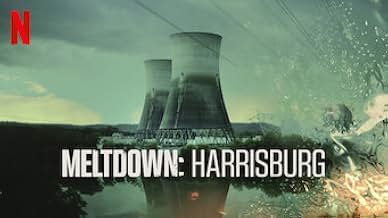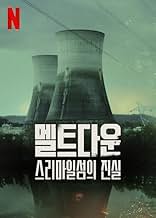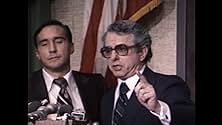AVALIAÇÃO DA IMDb
6,8/10
5,9 mil
SUA AVALIAÇÃO
A quase catástrofe na Usina Nuclear de Three Mile Island e o denunciante que falou para proteger a comunidade, perseguindo os eventos, controvérsias e efeitos do pior acidente nuclear da his... Ler tudoA quase catástrofe na Usina Nuclear de Three Mile Island e o denunciante que falou para proteger a comunidade, perseguindo os eventos, controvérsias e efeitos do pior acidente nuclear da história dos EUA.A quase catástrofe na Usina Nuclear de Three Mile Island e o denunciante que falou para proteger a comunidade, perseguindo os eventos, controvérsias e efeitos do pior acidente nuclear da história dos EUA.
- Prêmios
- 5 indicações no total
Explorar episódios
Avaliações em destaque
A few years after the meltdown, I was working for Air Products and Chemicals, an industrial gas company as a sales rep out of York, PA. TMI was my account and I went up there to do a cylinder count as they were paying thousands a month in rental charges for 5000 cylinders that had been on the island for 10 or more years. After my walk through I found only 200 cylinders. Big mystery until I talked to an old timer at the plant. Seems at the time of the meltdown and thereafter, employees would take full cylinders with 3000 psi, over to an embankment overlooking the Susquehanna River, lay them across two railroad ties and then knock the heads off the cylinders with a sledgehammer shooting them out over the the river a few hundred feet. These were the people running the plant.
There is a saying in Germany that goes a bit like: blessed are the ones without knowledge. Not sure if there is a similar saying in English or if it is exactly like I wrote it or has some tweak(s) to it.
But I think the point it makes, is clear. Because there are so many things that happen out there, that sometimes you may feel like it would be better not to even know about them. Worry about them - having it hang over your head .. clouding your day/life.
On the other hand, isn't it good to know what has happened, so we can hold the powers to be to account? Not sure it always works like that - but I do hope that enough people are out there trying to uncover the truth. And I am not talking Q or other conspiracy stuff. I am talking about things that happen, things that can be scientifically proven and hopefully averted. Things like what happened so many decades ago and is subject in this docu-series.
Netflix knows how to produce these shows one can easily say. Still not everyones cup of tea I reckon. So much to watch - you have to know if it is worth your time - and your own mood of course.
But I think the point it makes, is clear. Because there are so many things that happen out there, that sometimes you may feel like it would be better not to even know about them. Worry about them - having it hang over your head .. clouding your day/life.
On the other hand, isn't it good to know what has happened, so we can hold the powers to be to account? Not sure it always works like that - but I do hope that enough people are out there trying to uncover the truth. And I am not talking Q or other conspiracy stuff. I am talking about things that happen, things that can be scientifically proven and hopefully averted. Things like what happened so many decades ago and is subject in this docu-series.
Netflix knows how to produce these shows one can easily say. Still not everyones cup of tea I reckon. So much to watch - you have to know if it is worth your time - and your own mood of course.
The story of corruption and mismanagement is not that surprising. Still kinda interesting. But in typical Netflix fashion, long winded and repetitive.
But the real lesson of this documentary is how far we've come in nuclear tech.
We see the complete lack of computer technology in the 1970's. This makes it clear that the US should continue leading the way and sell Gen IV tech to the rest of the world -where the other 95% of humans live, and where carbon emissions are growing at an extraordinary rate. My beloved France and Germany are already returning to nuclear. But the rest of the world is polluting like crazy. Enough is enough.
But the real lesson of this documentary is how far we've come in nuclear tech.
We see the complete lack of computer technology in the 1970's. This makes it clear that the US should continue leading the way and sell Gen IV tech to the rest of the world -where the other 95% of humans live, and where carbon emissions are growing at an extraordinary rate. My beloved France and Germany are already returning to nuclear. But the rest of the world is polluting like crazy. Enough is enough.
I didn't feel like this was about fear in nuclear energy. This event set it back, but it's still viable and prevalent. This is about human error, regulation failure, and high level corporate and government corruption.
The main individual that this documentary centers around is Richard ("Rick") Parks. He was a nuclear engineer hired as part of the clean-up operation at Three Mile Island. As he unequivocally says at the beginning and end of the series, he's a believer in nuclear energy. He is a proponent.
What he's not a believer in, after his experience, is putting nuclear safety in the hands of private enterprise. The pressures to be profitable (or avoid losses) can force lapses in safety ... and that should never be on the table.
As far as a documentary is concerned, it's "ok". It lags a lot in the middle and didn't have much in the way of counterpoint experts. However, because it compiled and presented a lot of interesting information about the incident that I knew little about ... I have to give it credit. The idea that there was a second potential disaster involved (the polar crane operation) - was truly eye-opening.
As far as the downsides - there wasn't a lot of counterpoint from nuclear experts. This is understandable. From friends I have in the industry, they tell me the nuclear industry is a small community. If your name gets associated with anything anti-industry, the professional hit could be a career ender. Still, it would have been nice to see more scientific experts presented ... esp. If they had counterpoint ideas.
A fun fact they showed was that Pres. Jimmy Carter was a nuclear engineer and was once involved in repairing a damaged reactor himself. He showed up at Three Mile Island to calm tensions and support the industry.
Near the beginning I wondered if this would have been more interesting as a dramatization, like the Chernobyl mini-series. However, after a while, I understood why this may have been better as a documentary. The story they tell is more of disasters being averted ... which is great, but different than the stories of Chernobyl, Titanic, etc.
All in all - it's an interesting watch. The world is a bit different today than in 1979; there's a focus on solar, wind and even the sea for new sources of power. If they don't pan out soon, interest may eventually refocus on nuclear energy.
If you want nuclear accident suspense, watch "The China syndrome" and "Chernobyl". If you want whistleblower drama, watch "Silkwood" ... and (though it's a documentary) this series.
What he's not a believer in, after his experience, is putting nuclear safety in the hands of private enterprise. The pressures to be profitable (or avoid losses) can force lapses in safety ... and that should never be on the table.
As far as a documentary is concerned, it's "ok". It lags a lot in the middle and didn't have much in the way of counterpoint experts. However, because it compiled and presented a lot of interesting information about the incident that I knew little about ... I have to give it credit. The idea that there was a second potential disaster involved (the polar crane operation) - was truly eye-opening.
As far as the downsides - there wasn't a lot of counterpoint from nuclear experts. This is understandable. From friends I have in the industry, they tell me the nuclear industry is a small community. If your name gets associated with anything anti-industry, the professional hit could be a career ender. Still, it would have been nice to see more scientific experts presented ... esp. If they had counterpoint ideas.
A fun fact they showed was that Pres. Jimmy Carter was a nuclear engineer and was once involved in repairing a damaged reactor himself. He showed up at Three Mile Island to calm tensions and support the industry.
Near the beginning I wondered if this would have been more interesting as a dramatization, like the Chernobyl mini-series. However, after a while, I understood why this may have been better as a documentary. The story they tell is more of disasters being averted ... which is great, but different than the stories of Chernobyl, Titanic, etc.
All in all - it's an interesting watch. The world is a bit different today than in 1979; there's a focus on solar, wind and even the sea for new sources of power. If they don't pan out soon, interest may eventually refocus on nuclear energy.
If you want nuclear accident suspense, watch "The China syndrome" and "Chernobyl". If you want whistleblower drama, watch "Silkwood" ... and (though it's a documentary) this series.
Você sabia?
- ConexõesReferenced in Film Junk Podcast: Episode 846: Doctor Strange in the Multiverse of Madness (2022)
Principais escolhas
Faça login para avaliar e ver a lista de recomendações personalizadas
- How many seasons does Meltdown: Three Mile Island have?Fornecido pela Alexa
Detalhes
- Data de lançamento
- País de origem
- Central de atendimento oficial
- Idioma
- Também conhecido como
- Meltdown: Three Mile Island
- Empresas de produção
- Consulte mais créditos da empresa na IMDbPro
Contribua para esta página
Sugerir uma alteração ou adicionar conteúdo ausente



